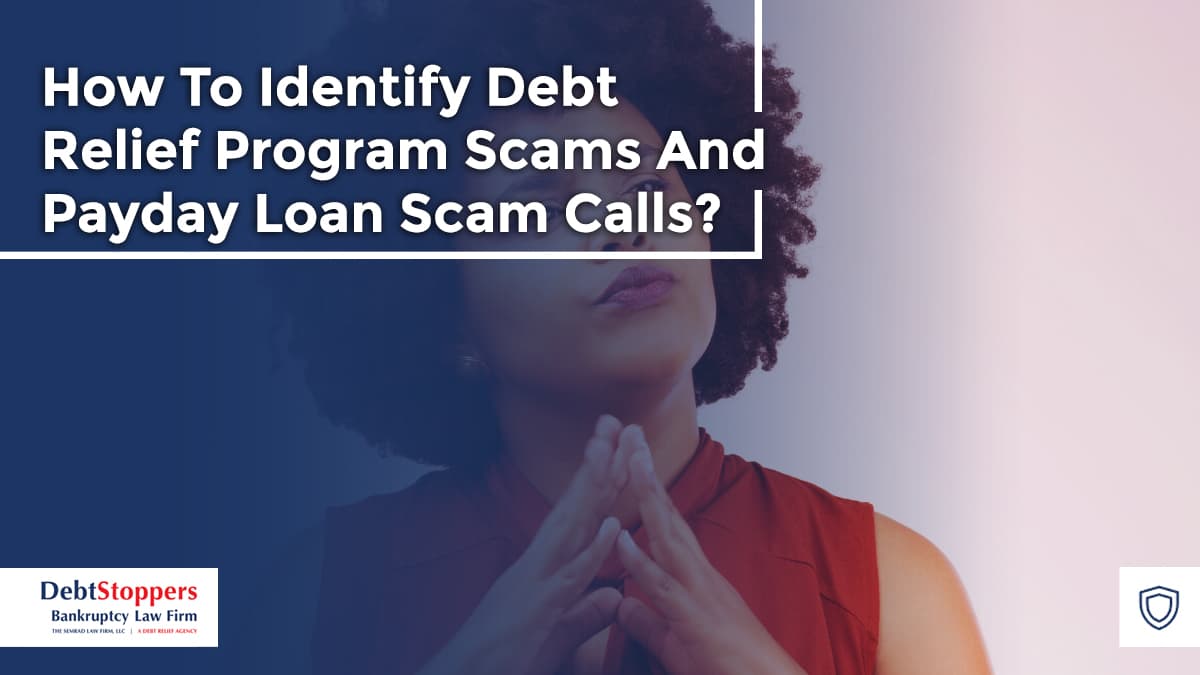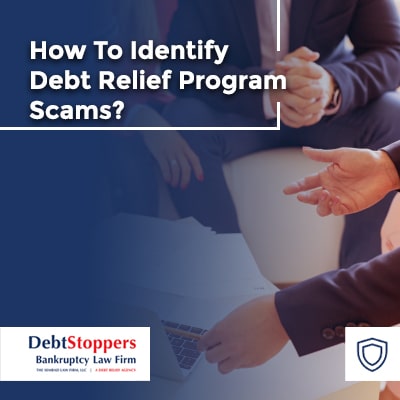How To Identify Debt Relief Program Scams And Payday Loan Scam Calls?

In times of financial difficulty, many people have thought debt relief programs and payday loan services seemed like a lifeline. However, not all offers are legitimate and countless people have fallen victim to scammers. It’s important to be cautious because scammers prey on people in vulnerable situations.
If you can recognize these scams, you’ll be better prepared to protect your finances and find trustworthy debt relief solutions. This blog will guide you through the common types of scams, how they operate, and actionable steps to identify and avoid them.
Understanding different types of scams
Debt-related scams generally fall into two categories – debt relief program scams and payday loan scams. While they differ in execution, the goal of each is to exploit people who are facing financial difficulties. Understanding the tactics these scammers use can help you protect your hard-earned money and avoid becoming the next victim of these popular scams.
What are debt relief program scams?
Debt relief program scams often present themselves as companies offering to consolidate or reduce your debt. They promise quick and easy solutions, such as settling your debts for pennies on the dollar or erasing them altogether. However, these promises are often too good to be true.
Scammers typically require an upfront fee before taking any action, a practice that is illegal under federal law. After collecting the fee, they may disappear or fail to deliver on their promises, leaving you deeper in debt. Some may even instruct you to stop making payments to your creditors, which can result in late fees, damaged credit, and legal action from creditors.
Signs of a debt relief scam include aggressive sales tactics, unrealistic promises, lack of accreditation, and refusal to provide written terms or contracts.
What are payday loan collection scams?
Payday loan collection scams involve fraudsters posing as collectors for payday loans. They may contact you by phone, email, or mail, demanding immediate payment for a loan you may not even owe. These scammers often use high-pressure tactics, including threats of legal action, wage garnishment, or arrest, to intimidate you into paying.
In many cases, scammers rely on personal information they’ve acquired through data breaches or phishing schemes. They use this information to appear credible, even though they have no legal claim to collect the debt. Legitimate payday loan collectors must follow the Fair Debt Collection Practices Act, which prohibits abusive or deceptive practices. Scammers, however, often operate outside these laws and rely on fear and confusion to succeed.

How To Identify Debt Relief Program Scams?
Recognizing the warning signs of debt relief scams can save you from financial loss and emotional stress. Some key red flags to watch for include upfront fees, guaranteed outcomes, lack of accreditation, pressure to stop payments, and no written or excessively confusing terms.
When in doubt, research the company thoroughly. Look for reviews, complaints, and information from reliable sources like the Better Business Bureau. Consulting with a trusted bankruptcy attorney is another effective way to verify the legitimacy of a debt relief program.
Upfront fees
Legitimate debt relief programs will not ask for payment before providing services. If a company demands upfront fees, it’s a major warning sign.
Caller doesn't identify himself
If the caller does not identify himself, you should specifically ask him to identify himself. If he refuses, this is a good sign that the call is not legitimate.
Missing information details
Likewise, if there is missing information and details, you should be cautious that the caller is not on the up and up.
Guarantee to make debt go away
No reputable company can guarantee specific results, such as eliminating all your debt or reducing it by a certain percentage. Be wary of overly optimistic promises. In other words, if it seems too good to be true, it probably is.
How To Identify Payday Loan Scam Calls?
Payday loan collection scams are particularly insidious because they often mimic legitimate collection practices
If you suspect a scam, do not provide personal or financial information. Report the incident to the Federal Trade Commission, your state attorney general’s office, or contact a debt relief attorney and let them handle it for you.
Threats
If someone threatens you with arrest, legal action, or violence, it’s likely a scam. The Fair Debt Collection Practices Act prohibits legitimate collectors from using these tactics.
Additionally, scammers often insist on immediate payment, sometimes using unconventional methods like gift cards, wire transfers, or prepaid debit cards. Legitimate collectors typically offer multiple payment options and give you time to resolve the debt.
Personal information required
If you’re contacted about a loan you don’t recognize, request written proof of the debt. Scammers often rely on vague or fabricated information to intimidate victims. Likewise, scammers are known to request personal information.
Legitimate collectors are required to provide a debt validation letter upon request. If the collector refuses or provides vague, unverifiable details, it’s a red flag.
You should also know that many scammers will manipulate caller ID to appear they are calling from a legitimate business or government agency so it’s wise to verify the identity of the caller before providing any information or making any payments.
Unprofessional manner
Scammers may have an unprofessional manner, which is often a good indicator that this is a scam. If you ask for verification or question them, they will frequently exhibit an unprofessional manner or worse, resort to threats.
How To Protect Yourself from Different Types of Scams?
The best defense against debt relief and payday loan scams is staying informed and proactive. To protect yourself from different types of scams, you should thoroughly research any company or collector to verify their legitimacy.
You should also know your rights. It’s wise to familiarize yourself with the FDCPA and other consumer protection laws to understand what debt collectors can and cannot do. You should also keep records by documenting all communication with debt relief companies or collectors, including dates, times, and the names of representatives. Finally, seek advice from a qualified bankruptcy attorney or financial counselor before committing to any debt relief program.

How Can DebtStoppers help you with debt relief and payday loan scams?
Navigating financial challenges requires guidance from experienced professionals. DebtStoppers is a top-rated law firm that projects its clients from scams, aggressive collectors, and financial uncertainty.
DebtStoppers has an A+ rating from the Better Business Bureau and our experienced attorneys have helped thousands of people. We will listen to you and provide tailored solutions to meet your needs. Contact us today for a free consultation and learn how we can help you regain control of your financial future and make life affordable again.





